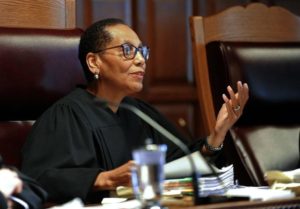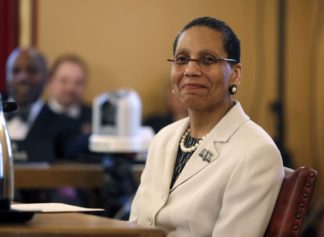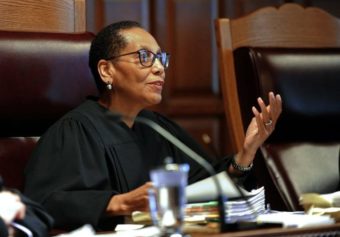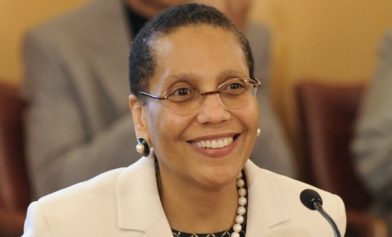
New York Judge Sheila Abdus-Salaam was found dead in the Hudson River Wednesday, April 12. (Photo by Hans Pennink/Associated Press)
The investigation into the death of Sheila Abdus-Salaam continues. Reported missing by her husband on April 11, she was found in the Hudson River just a day later in what police said then was an apparent suicide but now believe to be suspicious.
Abdus-Salaam, who was the first Black woman to serve as an associate judge on the New York Court of Appeals, also was the first African-American judge on New York’s highest court. She was appointed by New York Gov. Andrew Cuomo, who responded to her death by describing her as a “trailblazing jurist whose life in public service was in pursuit of a more fair and more just New York for all.
“Through her writings, her wisdom, and her unshakable moral compass, she was a force for good whose legacy will be felt for years to come.”
Abdus-Salaam’s death sent shock waves through the Harlem community she’d spent most of her adult life in, residents left to wonder why such a brilliant legal mind had taken her own life. It’s something that husband, Newark minister Gregory A. Jacobs, vehemently denies, insisting his wife was not suicidal.
In a statement, Jacobs said, “Those of us who loved Sheila and knew her well do not believe that these unfounded conclusions have any basis in reality. And, in the absence of any conclusive evidence, we believe such speculations to be unwarranted and irresponsible.”
Calling on officials to “refrain from any baseless commentary and conjecture concerning the circumstances” around her death, he added, “I now join with the NYPD in asking anyone in the neighborhood to step forward with any information that might help us determine what may have happened during those hours before her death.”
Abdus-Salaam was born Sheila Turner, despite being credited as the first U.S. Muslim appointed as a judge. According to her family, she’d never actually converted, choosing instead to merely adopt her first husband’s surname. In a recent statement, the Turner family revealed, “Sheila has not been a practicing Muslim for the past 20 years. She continued to use her first husband’s surname professionally. We will forever remember witnessing her happiness as she united in marriage to an Episcopal priest last year.
The statement also disputed reports from the Boston Globe, The New York Times and others that alleged both Abdus-Salaam’s mother and brother had committed suicide. The Turner family stated, “As we await the outcome of the investigation into the circumstances associated with her death, we want to correct some inaccuracies that have been reported in the media. Sheila’s mother, the matriarch of our family who died at age 92 in 2012, did not take her own life. Shelia’s younger brother, who died in 2014, lost his battle with terminal lung cancer.”
Abdus-Salaam’s humble Washington D.C. childhood was marked by poverty and the desire to change her circumstances. Early on, she’d realized that hard work and tenacity were essential. Speaking about her childhood, she once recalled, “If my mother wasn’t such a smart and resourceful woman, I might have ended up in foster care or worse. Although she dropped out of school, my mother realized that a good education would help us escape the poverty that we were trapped in.” Putting her mother’s advice to good use, Abdus-Salaam worked diligently, graduating from Barnard and earning her law degree from the Columbia School of Law.
Starting out as a staff attorney, she earned her stripes at East Brooklyn Legal Services before being becoming a judge in 1992. In addition to serving on the New York Civil Court, she spent nearly 15 years on the New York Supreme Court, holding the position until being appointed to the late Theodore T. Jones’ seat in 2013 by Cuomo.
As the first Black woman on New York’s Supreme Court, her appointment served as a not-so-subtle reminder that Black people and other minorities are still underrepresented in the legal ranks. In a 2016 study called The Gavel Gap, the American Constitution Society revealed that racial inequality continues to persist in the U.S. judicial system, with the majority of state courtrooms overwhelmingly presided over by white men. According to the study, as recently as 2014, state benches in Maine, New Hampshire, North Dakota and Vermont were entirely white, making figures like Abdus-Salaam a beacon of hope for people of color looking to enter the profession.
Already her presence is missed, with Manhattan District Attorney Cyrus Vance issuing a statement that stated, “She lived up to her reputation of being smart, principled and rigorously fair. Justice Abdus-Salaam leaves a void not only on the State’s highest bench but in the criminal justice system as a whole. On behalf of the entire Manhattan District Attorney’s Office, I would like to express my deepest condolences to her family, friends and colleagues.”
Abdus-Salaam had recently made waves following a ruling on Brooke S.B. and Elizabeth A. C.C., a gay couple involved in a custody dispute. The ruling effectively expanded the definition of parenthood, creating a path for same-sex parents, with Abdus-Salaam writing, “When a partner shows by clear and convincing evidence that the parties agreed to conceive a child and to raise the child together, the non-biological, non-adoptive partner has standing to seek visitation and custody.”
Lambda, a legal organization dedicated to advancing civil rights for the LGBT community and those affected by the HIV/AIDS virus, reacted to her death by adding a statement to its website. Written by constitutional litigation director, Susan Sommer, the statement reads, “Judge Abdus-Salaam saw clearly how damaging it was to keep LGBT parents from their children. … We owe her a tremendous debt of gratitude. She touched the lives of many New Yorkers; her legacy will live on.”
Now, family, friends and colleagues are left to wonder what actually happened to Abdus-Salaam. Speaking with The New York Times, Case Western Reserve University official Marilyn Mobley, a friend of the judge, stated, “What she shared with me is she had been under a lot of stress recently and that she was having trouble sleeping…The truth is she was accomplished, resilient and strong, and she had a breaking point like everyone else. I fear it got there.”
Others are not so convinced, including, now, the NYPD, which has backed off its earlier assessment and now labels the judge’s death “suspicious” based in part on a lack of physical trauma, witnesses to the incident or even a suicide note. For now, there remains more questions than answers. Following an inconclusive autopsy, the medical examiner revealed little other than “the cause and manner of death were pending further studies.”
However, her legacy lives on. As Claire Gutekunst, president of New York’s State Bar Association, recently noted, Abdus-Salaam “rose to become one of the seven judges in New York’s highest court, where her intellect, judicial temperament and wisdom earned her wide respect.”


